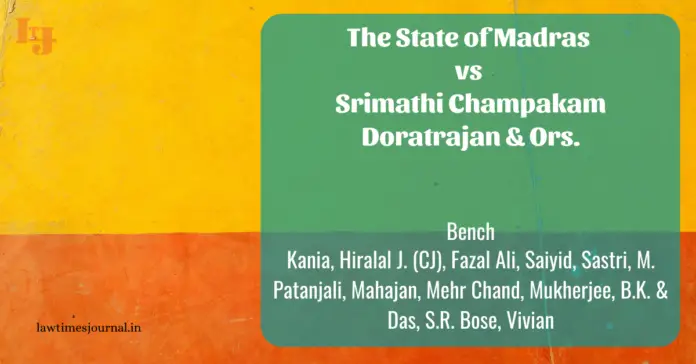
In the Supreme Court of India 1951 AIR 226, 1951 SCR 525 Civil Appellate Jurisdiction Petitioner State of Madras Respondents Srimathi Champakam Doratrajan and Sri Srinivasan Date of Judgement 9th April, 1951 Bench Hon’ble Justice Kania, Hiralal J. (CJ), Fazal Ali, Saiyid, Sastri, M. Patanjali, Mahajan, Mehr Chand, Mukherjee, B.K. & Das, S.R. Bose, Vivian
Introduction
The present case has discussed the enforceability of Directive Principles of State Policy in the courts of law and its overriding ability over the provisions contained in Chapter 3, Fundamental Rights. The Judgement has discussed the constitutionality of Communal G.O.
Facts
- The present case consist two cases State of Madras v. Srimathi Champakam Doratrajan, and State of Madras v. C.R. Srinivasan which are separate appeals from Judgement passed by Madras High Court.
- The State of Madras maintains four medical and four Engineering colleges. The state has reserved certain number of seats for candidates from other states, and discretionary allotment by the state. The balanced seats are apportioned between four distinct groups of districts.
- Many years before the commencement of the Constitution, the seats used to be filled up according to Communal G.O. which set forth certain proportions. According to Communal G.O. each set of 14 selected candidates should have 6 Non Brahmin Hindus, 2 Backward Hindus, 2 Brahmins, 2 Harijans, 1 Anglo Indian and Indian Christian, and 1 Muslim.
- The proportions set in Communal G.O. was adhered even after commencement of the Constitution. The G.O. No. 2208, dated 16th June, 1950, which laid down certain rules for selection of candidates into Medical Colleges has substantially reproduced proportions set by Communal G.O.
- On 7th June, 1950 Srimathi Champakam Doratrajan made an application to Madras High Court under Article 266, for protection of her fundamental rights under Article 15(1) & 29(2) and prayed for issuing suitable writ restraining state of Madras from enforcing the G.O. No. 2208.
- Sri Srinivasan had also made similar application before Madras High Court for restraining enforcement of Communal G.O.
- The Madras High Court allowed the both application made by Srimathi Champakam Doratrajan and Sri Srinivasan in order dated 27th July, 1950.
- Thus, State of Madras appealed before Supreme Court.
Contentions
The appellant contended that the provisions of Article 29(2) are to be read along with other Articles of the Constitution. The Article 46 charges the state with promoting with special care the economic and educational interest of weaker sections, to protect them from all forms of exploitation and social injustices. Although this Article is found in DPSP which is not enforceable by the Courts, the principles laid down therein are fundamental in governance of the country. Article 37 makes it obligatory to apply those principles in making laws. Therefore the provisions of A.46 override provisions of A. 29(2).
Issues
- Whether Article 29(2) of Constitution of India have to be read along with Article 46 of Indian Constitution.
- Whether Communal G.O. violates fundamental rights guaranteed under Article 29(2) of Constitution of India.
Ratio Decidendi:-
Under Article 29 of Indian Constitution, individual’s rights to get admission into any state aided Educational Institution without any discrimination on the grounds of caste, language, religion, and race is protected. The right given by Article 29 is right of individual as a citizen and not as member of any class of citizens or community. Therefore this right cannot be denied only on grounds of caste, religion, race, and language.
On the questions of reading provisions of Article 29 along with Article 46 of Directive Principles of State Policy, and that the applicability of provisions of DPSP (under Article 37) in making laws because of their fundamental character in the governance of the country, the Hon’ble Supreme Court stated that DPSPs are unenforceable by the court and the provisions encrypted in it cannot override the provisions of Fundamental Rights in Chapter 3. Fundamental Rights are sacrosanct and cannot be abridged by any Legislative Act. DPSPs have to run as subsidiary to Fundamental Rights.
The Court denied the above arguments of appellant that were founded on Article 46 stating that otherwise the insertion of clause(4) in Article 16 would have been unnecessary. Pointing to the omission of any such expression {I.e. clause similar to A.16(4)} from Article 29 the court stated that the legislature did not find it necessary in case of educational institutions.
In case of petitioner Shrinivasan, the appellant is denied admission not just on the basis of caste but on various ground consisting I) his caste ii) his caste was allotted only 2 seats out of 14 and iii) those 3 seats are filled by more meritorious students of his caste. Evaluating this scenario the court stated that the above grounds of denial applies to those 2 seats only. But in respect of seats reserved for other communities the petitioner is denied admission only on the basis of his caste.
Thus the court concluded that classification in Communal G.O. is based on caste, race, religion. Therefore it is opposed to Constitution and violates rights of individuals in Article 29(2).
Orbiter Dictum
The provisions of Chapter 4 of Directive Principles of State Policy are enforceable so long as there is no infringement of fundamental rights.
Judgement
The court opined that the Communal G.O. is inconsistent with Article 29(2) of the Constitution of India and that it is void under Article 13. The court dismissed the appeal of appellant
Conclusion
The present case has discussed the extent of enforceability of Directive Principles of State Policy. It also discussed the constitutionality of Communal G.O. which proportioned each 14 seats of Medical and Engineering Colleges on the basis of Caste.
“The views of the authors are personal“








